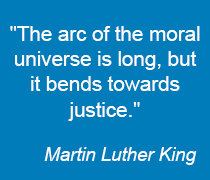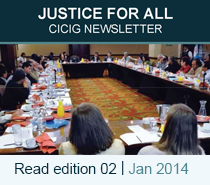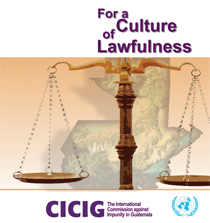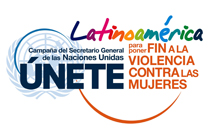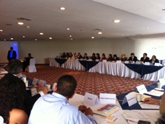 Guatemala, October 14, 2011. The term "civil society" refers to the set of institutions which defend the individual, political and social rights of citizens. Civil society often serves as a mediator between individuals and the State in addressing certain social needs.
Guatemala, October 14, 2011. The term "civil society" refers to the set of institutions which defend the individual, political and social rights of citizens. Civil society often serves as a mediator between individuals and the State in addressing certain social needs.
The importance of civil society lies in its ability to coordinate the promotion and expression of support for economic, political and social changes in a country.
Therefore, these groups, comprised of social leaders, should be listened to and supported in their oversight and other actions to guarantee a more balanced, fair, equal, inclusive and participative society.
Civil society
Guatemalan social groups engage in:
- Monitoring selection processes of public office-bearers;
- Overseeing public spending of judicial institutions;
- Overseeing emblematic criminal cases;
- Creating bills for legal reforms to streamline justice administration.
In countries such as Mexico, El Salvador, Argentina and Colombia, civil groups have had a bearing on their countries' public policies through the proposals, actions and complaints they have made regarding social, political and economic issues.
By exerting an influence over issues such as the environment, the return of displaced individuals, education and legislation reforms, civil organizations have offered critical and propositive analyses which have enabled the aforementioned States to take public policy decisions to effectively and efficiently meet the needs of their countries.
Guatemala
The participation of the Guatemalan civil society in the judicial system has centered on overseeing the selection processes of public office‑bearers, public spending and emblematic criminal cases. Moreover, it has participated in amending different laws to streamline the administration of justice.
The disappearance of thousands of individuals during the armed conflict resulted in the emergence of the country's first social groups in the seventies, which demanded information from the Government as to the whereabouts of their next of kin.
As a result, these groups began to form and gain strength so that the authorities would stop and listen to them. Furthermore, they sought to place the authorities under pressure to meet their demands.
"At the time, the first steps of civil society were witnessed when a series of habeas corpus petitions were filed so as to test the country's judicial system," stated Iduvina Hernández, director of the Seguridad en Democracia [Security in Democracy] (SEDEM) group.
Hernández believes another example of the key participation of social groups was the petition to shed light on the murder of the anthropologist Mirna Mack, because it led to the creation of a movement focused on addressing the need to reform the justice system, given the legal obstacles that arose during the proceedings.
This, together with the pressure and support of civil groups, led to the first amendments to the Code of Criminal Procedure, including the removal of military court so that army officials would be tried in courts of justice for common crimes.
Selection of civil servants
According to Sandino Asturias, director of the Centre of Guatemalan Studies (CEG), "when judicial authorities are chosen, society must play a key role in preventing interference with the independence of the branches of government. It is common for parallel groups to intervene in such processes and select the judges, the Attorney General and the Comptroller General."
Furthermore, he added that the proposed Nominating Commissions Law was the work of civil society, and the social oversight they exercised in the last civil servant elections helped to rule out inappropriate candidates, in particular in selecting the judges of the Supreme Court of Justice and the Attorney General of the Republic.
According to Iduvina Hernández, the participation of social groups detected that the system to choose public office-bearers was "prostituted and corrupted though the process to establish the Nominating Commissions, because the process was not transparent".
He therefore proposes "reforming the means in which the commission members are chosen so that private and State-run universities are not involved in future selection processes, because their representatives make decisions based on sectoral interests and not in an objective manner".
Public spending
As to oversight of public spending, social groups monitor how justice sector institutions—such as the Judiciary (OJ), the Constitutional Court (CC) and the Institute of Public Criminal Defense—waste their funding.
"We have seen how various State institutions have wasted money on unnecessary trips or compensation requested by outgoing judges, hence limiting the institution’s budget for fulfilling its responsibilities," stressed Hernández.
Civil society representatives also take part in working committees for State spending, implemented in conjunction with Congress, and have supported a bill to improve such State spending.
"We are proposing anti-corruption mechanisms so that this scourge is more severely punished as well as creating other means of improving public spending. We hope to eradicate the channels used by the State to embezzle funds, such as the use of trust funds or the hiring of NGOs to administer public works," explained Asturias.
Asturias also said that social groups have influenced the public denunciation of corruption in the judicial system: "We have denounced the high levels of corruption seen in judicial rulings, such as the Portillo, Vielmman, Mattus and Giammattei cases."
He indicated that social condemnation highlights the corruption that persists in the judicial system and strives to prevent such proceedings from joining the list of impunity cases, regardless of the media campaigns that are launched in response.
Judicial independence
Hernández and Asturias agreed that judicial independence is important in making the administration of justice more effective: "The Judiciary needs to be urgently and profoundly purged, because in many cases there is information leakage, influence peddling or illegal rulings—which are the result of the judges' ties to criminal structures," stressed Hernández.
In this regard, Asturias said that true independence would be achieved when there is a judicial branch that is autonomous and independent from political and military powers. "This would be possible by truly purging the judicial system and offering protection to judges and prosecutors."
Therefore, they stated their willingness to support processes to purge the system and identify the officials who have acted inappropriately and favored certain individuals or sectors.
The future plans of these social organizations include continuing to work with other groups on anti-corruption and pro-transparency projects, conducting periodical surveys of the National Agreement for the Advancement of Security and Justice and public spending, and completing comparative analyses of citizen security and defence.


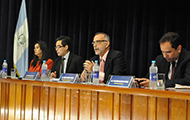
 Guatemala, October 14, 2011. The term "civil society" refers to the set of institutions which defend the individual, political and social rights of citizens. Civil society often serves as a mediator between individuals and the State in addressing certain social needs.
Guatemala, October 14, 2011. The term "civil society" refers to the set of institutions which defend the individual, political and social rights of citizens. Civil society often serves as a mediator between individuals and the State in addressing certain social needs.